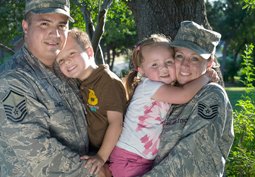JOINT BASE SAN ANTONIO-RANDOLPH, Texas (AFNS) — If you’re newly married, newly divorced, have dependent children or have a child who was born out of wedlock you may be confused about military benefits.
Some family situations are complicated or even awkward, so Airmen may be reluctant to pursue benefits to which their dependents – or former dependents – are legally entitled, said Ed Yoder, AFPC Defense Enrollment Eligibility Reporting System Project office.
“Responsibility and accountability are deeply held values for Airmen, but securing dependent benefits can seem daunting and often Airmen aren’t sure what to do or who to ask for help,” Yoder said. “AFPC and local military personnel sections are here to help people figure out what their benefits are and how to get them.”
Routinely, new Airmen wait far too long to secure benefits for their dependents, which can be a problem, he said.
“We have a number of basic training members, ROTC graduates and Academy cadets who marry and don’t have the first idea what to do to make sure their dependents are covered. If you wait until you arrive at technical school or your first duty station, your new spouse or child won’t have the coverage they’re entitled to,” said Yoder.
The first thing an Airman should do when he or she has a new dependent is contact the local military personnel section to enroll the family member in DEERS and get dependent identification cards.
“Until they’re in DEERS and have their ID cards, your dependents won’t have access to medical care or any base support and service programs,” said Yoder. “So do that first and do it immediately. After they’re enrolled, you can make changes and updates online, but initial enrollment must be in person.”
Less common situations can be uncomfortable, but non-traditional dependents – like children of divorced members, children born out of wedlock and some former spouses – also have a right to certain benefits.
“Some situations can be sensitive, yet need to be talked about. Marriage, divorce, having babies, aging parents, sickness and infirmity, these are all important issues and people need to know what their options are.”
Following a divorce, an Airman’s dependent children have a right to benefits, even if they live with a non-military parent, and children born out of wedlock also have a right to dependent benefits, Yoder explained. The process of securing them is different, though. Following divorce, most Airmen will be able to update DEERS status online, but enrolling a child born out of wedlock will take an in-person visit to the MPS after legal documents have been accomplished.
In addition, some former spouses may be entitled to an ID card and DEERS enrollment.
“If a member divorces, his or her spouse may be eligible for continued benefits, but there are very specific eligibility requirements,” Yoder said.
The member must have at least 20 years of service. The marriage must have lasted at least 20 years, and 15 to 20 years of that marriage must have been during the Airman’s active duty service. If those criteria apply, the member can submit a request for former spouse determination.
“Taking care of dependents is a personal and professional responsibility. Airmen who are worried about family situations cannot fully focus on their mission,” Yoder said. “The military personnel system is here to help Airmen take care of their families. We have developed detailed information and guidance, and every MPS has professionals in place ready to help as well. But Airmen have to take the first step.”
Detailed guidance on a host of dependent benefits programs and situations is available on the myPers website. Go to https://mypers.af.mil, select “search all components” in the drop down menu, and enter “dependent entitlements” in the search window.



